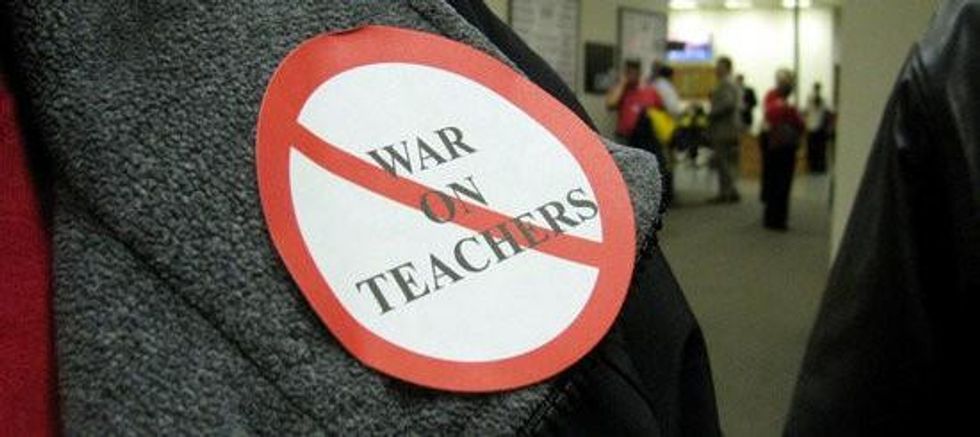All over the nation, teachers are under attack. Politicians of both parties, in every state, have blamed teachers and their unions for the nation's low standing on international tests and our nation's inability to create the educated labor force our economy needs.
Mass firings of teachers in so-called failing schools have taken place in municipalities throughout the nation and some states have made a public ritual of humiliating teachers. In Los Angeles and New York, teacher ratings based on student standardized test scores -- said by many to be inaccurate -- have been published by the press. As a result, great teachers have been labeled as incompetent and some are leaving the profession. A new study showed that teachers' job satisfaction has plummeted in recent years.
Big budget films such as Bad Teacher and the documentary Waiting for Superman popularize the idea that public school teachers prevent poor children of color from getting a good education, while corporate funded organizations perpetuate the idea that the only way for children to excel is if their teachers lose their job security and bargaining rights.
Why has this campaign attracted such strong bipartisan support and why has the public failed to speak out loudly against it?
Attacks on teachers have occurred in the midst of a broad-based attack on the bargaining rights and benefits of all public workers -- but even by that standard, teachers have been singled out.
In New York State, where teacher evaluations were just released to the press, the state Legislature just passed -- and the governor signed -- a bill that exempted police and firefighters from having their evaluations released to the public. What better symbolizes the way teachers have become "fair game" for public demonization?
There are huge profits to be made in the testing industry, in educational technologies that replace teachers, and in constructing and managing charter schools, so it is not hard to see why some people in the corporate world would benefit from attacking public education and teachers unions.
But why are so many parents and the general public buying into this campaign? Certainly politicians wouldn't be voting to take away teachers' rights if they didn't think it would get votes.
Let's look at the way many in America's shrinking middle class and battered working class view the teachers in their midst.
Large numbers of people are losing their jobs and homes, earning sub-standard wages and taking in their children who can't find jobs. All the while, they see teachers, 80 percent of them women, who make better salaries than they do, have better health plans and pensions, and get two or three months off in the summer!
Many say to themselves: "Who do teachers think they are? Why should they live so well on my tax dollars when I can barely keep my head above water? At the very least, they should feel some of the insecurity I feel every day and face the kind of performance assessments workers in the private sector deal with all the time."
That is the same sentiment that America's unionized blue collar workers faced in the '70's and '80's and '90's when big corporations started closing factories and slashing wages and benefits. The non-unionized work force in big industrial states refused to rally to the defense of their unionized counterparts, and industrial unions lost battles to maintain their wage and benefit levels that allowed them to live a middle-class life style or prevent plants from relocating.
That posture is short-sighted for two reasons.
First the same policies that create an insecure, deeply resentful teaching force will end up harming children.
Not only will excessive standardized tests -- now used to evaluate teachers -- make children hate school, but the whole test-based accountability movement has served to narrow the curriculum and turn many classrooms into test-prep factories. Parents are discovering that their children are not only unhappy at school but not well prepared for higher education or challenging careers.
There is another more insidious consequence of the attack on teaching. Every time you undermine the job security, working conditions, and wages of one group of workers, it makes it easier for employers to undermine them for all workers. This is why, during the Depression, many unemployed people organized in support of workers on strike, even though anybody with a job in that era was relatively privileged. They believed in the concept of solidarity -- the idea that working people could only progress if they did so together, and if one group of workers improved their conditions, it would ultimately improve conditions for all.
That kind of solidarity, for the most part, is gone now. If American workers are ever going to regain their fair share of national income and win back respect on and off the jobs, it is something they are going to have to re-learn. The Occupy Movement has brought back the idea of solidarity with its image of "the 99 percent fighting the 1 Percent," but this idea has not yet spread fast enough to stop the war on teachers.
There are, though, signs of hope. In Chicago and New York, Occupy groups are uniting with teachers, parents and students to fight school closings; in New York, parents groups have rallied to the defense of teachers stigmatized by the publication of outrageously inaccurate teacher ratings; in Florida, a pernicious "parent trigger" law favoring charter schools was just defeated in the legislature with a big push from parents.
These actions are, hopefully, just the beginning of a transformation of public consciousness that will lead to an end of the war on teachers.
A version of this first appeared on the blog With A Brooklyn Accent.


